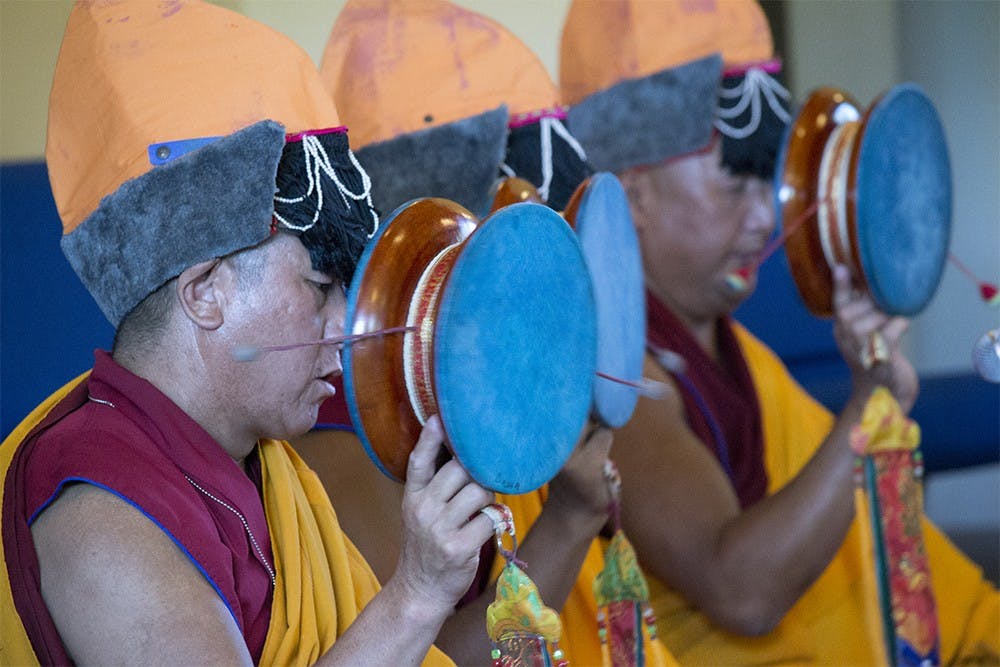The Labrang Tashi Kyil Monastery in Tibet sent seven of its monks on a tour to the United States, and they came to Bloomington to present teachings of peace and compassion, their translator Tenpa Phunstok said.
“We have three missions,” Phunstok said. “To spread Buddha’s teaching, to preserve our culture and to raise funds for the monastery.”
On Monday, they concluded a three-part series of events at Unity with a Fire Puja ceremony.
Phunstok addressed a small but eclectic gathering of people sitting on the ground by the parking lot. He explained that the monks were about to present an offering to invisible beings, recognizing suffering.
At his invitation, the audience — young children, people with dreadlocks and people with white hair — stood to circle the monks in the lot.
Pine branches lay across an altar. People quickly drew their phones as they waited to push “record.”
On cue, an assistant dropped fire onto the altar, sending a swirling smoky cloud to the sky.
Silence changed to chanting.
Some people watching stood with palms up before them, others with hands clasped behind their backs. Some watched the ceremony through the screen of their phone.
From chanting, the monks moved to playing the instruments they had brought. Two of them played trumpets that reached from their mouths to the ground.
A woman turned her face upward, and it was washed in sunlight.
The ceremony ended suddenly. Phunstok invited people to follow the monks inside Unity.
Quietly people filled Unity’s auditorium, passing tables of beads and fabrics as they walked.
Unity’s Center Administrator Danilled Bachant-Belle said the center was thrilled to have the monks use their facilities to teach.
“Unity’s teaching embraces all faiths,” Bachant-Belle said. He said having them here “is part of how we embrace all the faiths, all the teachings.”
Bachant-Belle said that Unity’s founders were Christian, but interested in gathering all faiths together. By having the monks present, Bachant-Belle said people have the opportunity to look at faith with another perspective.
“They learn from us, and we learn from them,” Bachant-Belle said.
For twenty-seven-year-old Phunstok, the journey of learning and teaching the Buddhist faith began when he was eight years old.
“When I would get around the monks, it gave me such a peace,” Phunstok said. “I wanted to learn compassion.”
Despite his age, he took a vow to spend his life as a monk.
From there, he eventually joined a Tibetan Buddhist monastery — one of only 119 others in the country, he said — where he and other monks spent their days studying languages, other philosophies and the “heart.”
“I think studying is the most important,” Phunstok said. “Without education we can’t make big changes in the world.”
But, Phunstok said, compassion is also necessary, which is why the monks were on tour.
Phunstok said the seven of them had been chosen specifically by the monastery to go to the U.S. and had to study more diligently than others in order to be prepared for the tour. But he insisted that they were still the same as other monks.
“We are all ordinary,” Phunstok said.
Inside Unity, the men finished the day with two more ceremonies, one of which involved costuming that made two of them look like rainbow skeletons as they danced to the front of the room.
Ruth Green said she found the experience transformative.
“I was almost in a trance-like state when they were praying,” Green said. “I feel a peace that goes beyond words.”
She and her husband Bill Perry had saw them Sunday and returned Monday to see more of their tour of Bloomington.
Green said that on Sunday the monks had affected them so much that the peace followed the two of them out of Unity.
“When we got home we didn’t feel like doing anything except being quiet and peaceful like them,” Green said.
Perry said he thought watching the Tibetan monks embodied the inclusive mission of Unity.
“It’s a wonderful example of the universality of experiencing God,” Perry said.





